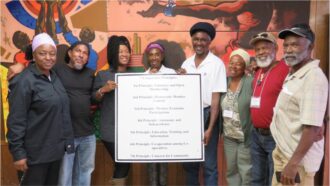Getting ‘back to the basics' is a common phrase heard throughout the community. The basics or pillars of sustainable agriculture based on the Sustainable Agriculture Research and Education Program are quality of life, stewardship, and profitability. In 2021, Louis E. Petersen, Jr. state coordinator at the University of the Virgin Islands School of Agriculture was awarded a SARE Professional Development Program Grant to work on advancing professional development about the cooperative business model through training and mentorship. The project increased the number of local trainers who are educated about the cooperative business model while developing a long-term mentoring program.
Awarded $87,833 in 2020, his project provided technical assistance and mentoring between farmers with guidance and support from the Federation of Southern Cooperatives, the West Georgia Farmers Cooperative, as well as the Virgin Islands Division of Corporation and Trademarks under the Office of the Lieutenant Governor, and other members of the Cooperative Extension Service staff.
“The participants received the training really well and wanted to do something concrete as a result. For the very first time our farmers and entrepreneurs had a full training,” said Petersen.
As a result of these efforts, the trainees organized themselves into two groups for the purpose of discussing and developing strategies for the development of two cooperative entities – a producer-type cooperative and a grocery/food hub-type operation. In the case of one group, the members have formulated bylaws and articles of incorporation based on the systematic, methodical approach that was shared during their training. Although there have been endeavors to develop cooperative businesses in the past, these current advances reflect the greatest successful efforts at cooperative development in recent times in the Virgin Islands. In the past, cooperative development in the U.S. Virgin Islands has been hampered by a lack of education and the mentorship support of experienced cooperators. The overall success of this initiative, to date, has been due to the funding received from the Southern Sustainable Agriculture Research and Education Program and the mentorship provided by West Georgia Farmers’ Cooperative and the Federation of Southern Cooperatives.
The training included a comprehensive five-day course comprised of five modules with the final day consisting of group activities where participants used the lessons learned in the previous days to form mock cooperative businesses. All activities emphasized interactive role-playing approaches which stimulated group dynamics and encouraged behavioral change.
The training included a comprehensive five-day course comprised of five modules with the final day consisting of group activities where participants used the lessons learned in the previous days to form mock cooperative businesses. All activities emphasized interactive role-playing approaches which stimulated group dynamics and encouraged behavioral change. Evaluated primarily through pre and post training surveys designed to collect qualitative and quantitative data, various objectives were met including increasing the level of knowledge and awareness among the trainees as well as increasing the number of local trainers better prepared to assist producers with cooperative business development towards enhancing economic profitability and sustainability. The experience also fostered mentorship connections between the trainees, farmers, and a successful model of a cooperative enterprise stateside which has encouraged the ongoing formation of local cooperatives.
Evaluated primarily through pre and post training surveys designed to collect qualitative and quantitative data, various objectives were met including increasing the level of knowledge and awareness among the trainees as well as increasing the number of local trainers better prepared to assist producers with cooperative business development towards enhancing economic profitability and sustainability. The experience also fostered mentorship connections between the trainees, farmers, and a successful model of a cooperative enterprise stateside which has encouraged the ongoing formation of local cooperatives.
Based on meeting the proposed objectives, the desired behavioral changes included the demonstration of an increased capacity to respond to cooperative related inquiries and assist producers. The project also resulted in an increase in farmer commitment to organize and join a cooperative venture.
Funded by the USDA National Institute of Food and Agriculture (NIFA), Southern SARE operates under cooperative agreements with the University of Georgia, Fort Valley State University, and the Kerr Center for Sustainable Agriculture to offer competitive grants to advance sustainable agriculture in America's Southern region. Competitive research grants are the primary tools of the SARE program. The overall objective of SARE is to position agricultural communities so the most sustainable approaches available permeate U.S. agriculture. The result is food, fiber and animal products are sustainably produced in healthy communities in an environment where farmers are respected, rewarded, and encouraged to innovate.
